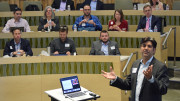DENVER, Colo. – “Take a look around this room,” Steven Krein, CEO and co-founder of Startup Health, told the crowd of innovators, clinicians, and healthcare executives that filled Krugman Conference Hall last Wednesday. “This is a medical campus. And hundreds of you turned out tonight to hear about entrepreneurship and innovation, engagement and re-imagination.”
Krein was speaking at the launch of Startup Health Colorado, a three-year-long partnership between his organization and three of Colorado’s top healthcare institutions – UCHealth, Children’s Hospital Colorado, and CU Anschutz, where the launch took place. Judging by attendance at the sold-out event, it was clear that Colorado’s thriving health innovation community was eager to become the newest regiment in what Krein referred to as Startup Health’s “global army of health transformers” – a growing, worldwide network of almost 200 health-tech startups.
“As we’ve traveled around the world talking to entrepreneurs, we’ve learned that they’re not just talking about changing the US healthcare system, they’re not just talking about patient engagement platforms, and they’re not just talking about businesses,” continued Krein. “They’re talking about moonshots, they’re talking about the ability to cure diseases like cancer, they’re talking about women’s health and children’s health and prioritizing them like never before.”
To empower these entrepreneurs to achieve their ambitions, Startup Health has spent the last five years building a vast network that provides its members with mentors, access to a multitude of partners, and opportunities to have their stories told. “If patients and their family members knew of the incredible work being done by entrepreneurs and institutions like CU Anschutz,” Krein explained, “they would be blown away. They would have so much more hope than they have right now.”
In addition to gaining access to Startup Health’s global network, the 30 or more health-tech startups that will be accepted into Startup Health Colorado will have the opportunity to work side-by-side with clinicians who are intent on helping them commercialize their solutions.
“What this environment has given us as a company is a living lab where I can go into the emergency department and sit with clinicians and talk about the technology we’ve deployed in their clinical workflow,” said Carm Huntress, CEO of RxRevu, the first company to be accepted into Startup Health Colorado. “That’s such a rare thing. A lot of people talk about it, but to live it is incredible.”
During the launch, Krein announced a call for innovations to fill Startup Health Colorado’s first cohort of startups. The call specifies that Startup Health is seeking companies that address three of its 10 health moonshots, a set of healthcare-focused problem areas – similar to 10.10.10’s wicked health problems – that includes nutrition, mental health, and access to care.
“In the past, digital health entrepreneurs would build a hammer and then run around looking for nails that fit that hammer,” said Wayne Guerra, co-founder of iTriage and entrepreneur-in-residence at CU Innovations. “What we’re doing here is trying to build that hammer for nails that already exist.”

The launch featured a panel discussion on improving health and wellbeing for people around the world.
Startup Health Colorado is Startup Health’s second regional affiliate. The global organization, which is based in New York, set up Startup Health Finland, its first regional affiliate, in November of last year. According to Krein, Startup Health is currently considering opening offices in 25 more regions around the world over the next two years.
“What we’re doing in Colorado is connecting this incredible, vibrant local ecosystem that people like Jeffrey Nathanson and Mike Biselli have built with our global ecosystem,” Krein explained. “With a global army and a regional army working together and sharing the same mindset, anything can happen.”
By the end of the event, it was apparent that for Krein the term “global army of health transformers” was synonymous with “digital health ecosystem” and “health-tech community,” in that each term attempted to convey the current need for a mass mobilization of innovators, clinicians, executives, and more to use technology to fundamentally reimagine the healthcare system – making it more accessible, more affordable, and more efficient in the process.
“When we launched Startup Health, we asked ourselves, ‘How can we accomplish in 25 years what before would have taken 100,” Krein told the audience. “The answer is in that army working together.”
Like the coverage that CyberMed News provides? Follow us on Twitter, LinkedIn, and Facebook to keep up-to-date on the latest developments in digital health.






Be the first to comment on "Startup Health’s Global Army of Health Transformers Marches to Colorado"